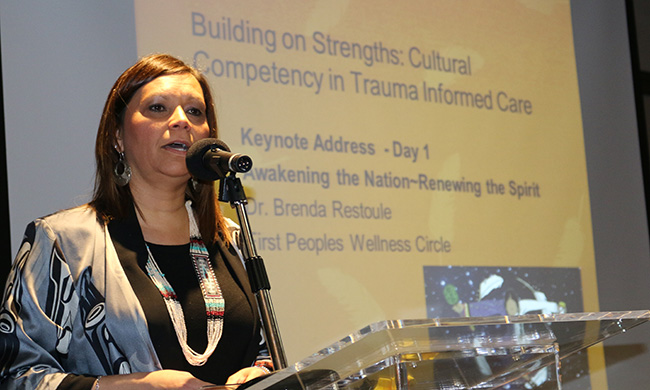Dr. Restoule speaks about cultural competency and trauma informed care at health conference

By Marci Becking
SAULT STE. MARIE — Dr. Brenda Restoule, citizen of Dokis First Nation, gave a keynote on cultural competency and trauma informed care at the “Awakening the Nation — Renewing the Spirit” health conference put on by the Union of Ontario Indians health department.
“We are decolonizing,” says Dr. Restoule who works in Nipissing First Nation. “We listen to our Elders – like Willard Pine spoke about, passing knowledge down to other generations on mental health and wellness. When we hear non-indigenous people say about residential schools ‘just get over it’ — well we weren’t allowed to talk about that trauma before. There is on-going colonizing still going on today 64.2% of Indian Residential School survivors in Canada met the criteria for Post Traumatic Stress Disorder. And of course there is a ripple effect of inter-generational effects.
Trauma informed care requires an understanding of trauma in all aspects of service delivers.
“We need to place the survivor’s safety, choice and control as a priority. Create a treatment culture of non violence, learning and collaboration. Treatment requires building confidence and trust to facilitate healing and recovery,” says Restoule.
“Facilitate engagement and meaningful participation by individuals and families in planning of services and programs. Trauma informed care means creating collaborative relationships with other systems from the social determinants of health.”
“When we look at the Truth and Reconciliation Commissions recommendations, we are looking at 100 plus years of assault on our identity,” says Restoule. “We are all traumatized – most of us were told in school that we are savages. That has an indirect impact on our development.”
Consequences of Inter-generational Trauma is the loss of cultural understanding and cultural behaviours to effectively deal with trauma.
“We have a cultural of feeling inferior,” says Restoule. “We see that with addictions, Murdered and Missing Indigenous People and the child welfare system — we are still experiencing trauma. Trauma has also altered our brain chemistry creating unhealthy behaviours of coping. We have a history of maladaptive coping. Trauma changes the physical look of our brains.
Cultural competence is a set of congruent behaviours, attitudes and policies that come together in a system agency or among professionals that enables effective work in cross-cultural settings.
Some 150 participants listened to Dr. Restoule, along with Grand Council Chief Patrick Madahbee who had some positive news to share on the political side of things. Madahbee, who is also the chair of the Chiefs of Ontario Health Committee shared with conference participates about a two-year review with Non-Insured Health Benefits — changes are happening as we speak on a number of issues such as medical transportation.
“Health is in a state of crisis,” says Madahbee. “We were frustrated working with the last federal government for the last 10 years. This crisis has to end and we need all hands on deck to do this. It’s conferences like this one that help the advocacy for change. How can we have our economic development and other initiatives move forward if our people are not well? We need to be healthy, feel empowered and be positive.”

